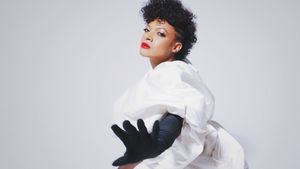Carl Clemons-Hopkins has been a steady, standout force in the Hacks universe since the beginning, bringing heart, humor, and complexity to Marcus, Deborah Vance’s trusted right-hand.
An accomplished stage actor and Emmy nominee, Hopkins has a layered portrayal of Marcus, which has made the nonbinary actor an indispensable part of the show’s DNA — a character who not only manages Deborah’s empire but also anchors her chaotic world with poise and loyalty.
This season, however, fans witness a major shift in the Marcus-Deborah dynamic. At the onset, Marcus attempted to sell Deborah's QVC line, which he helmed, to start his own company; it created a rift between the two. And the rest of the episodes have centered on Deborah's quest to launch her late-night comedy show sans her right-hand man.
Marcus’s screen time is now less frequent, but his absence is deeply felt. Without Marcus’s steady hand keeping things in check, Deborah’s world starts to fray at the edges, revealing just how crucial he is to her success — and sanity.
 Carl Clemons Hopkins on HacksCourtesy HBO Max
Carl Clemons Hopkins on HacksCourtesy HBO Max
This season on Hacks, we see Marcus finally step out of Deborah Vance’s orbit — but then, he’s not seen much after. Was that absence intentional for the sake of the story, or do you think Marcus had more to say in his own silence?
Hopkins: I think it's it's definitely a continuation of a story that really was started in season 1, but definitely was jump-started in season 3. I really enjoy it because it kind of parallels Kaitlin Olson's character's story, [Deborah's daughter] DJ, in that these are the two people who have known Deborah the longest or closest to this person. But DJ last season and Marcus this season, they're now the only two people to kind of stop the cycle. We saw her last season, DJ, that is, recognize the [erratic] nature in Deborah and recognize how she participates in the cycle. Last season into this season, we see Marcus recognizing something that [his love interest played by Johnny Sibilly] Wilson told him, a while ago, there has to be more than that his world that's not just revolving around this one person.
While we do see a lot less of Marcus, I like to see it as a character minding his Black-ass business for the first time really in his life. He steps up to this person, faces the wrath of this person, faces the repercussions of this person that we get to see in the first two episodes, but it’s a real breakaway. It’s a real moment for him to kind of take his life back in a really great way. He's kind of now just not flailing, but exploring what those options are. We get to see a glimmer, like a glimmer of a new dream coming in episode 10 involving Vegas and kind of his passions coming into one. So I think it's going to be an interesting season. I personally am really excited that Marcus was able to take this step that we've been wanting [him] to take for so long.
Do you imagine a spin-off where Marcus builds an empire with the same poise and precision he once gave to Deborah?
I think there is definitely a world where he builds an empire of the same poise and precision, and I think it may be one where we get to see. I would love it if we got to see what his creative output might be. I know that he's someone who can do all things, but he can definitely do what he did again. I would be interested in seeing what would be centered with that new building. That could be interesting.
If Marcus were to write a memoir, what would the most controversial chapter be called — and why would Deborah definitely sue over it?
It's interesting because you know, in season 3 and in previous seasons, there's all of this talk about and discovery of, you know, pre-Ava Deborah and pre-Internet comedy and some of the jokes and things she said or quote, unquote, "got away with." I think the most controversial thing would be I think they had a moment. I'm not saying he hauled off and smacked a woman across the face, but I am saying I think a line was crossed and was never crossed again. Part of her need for him is because he knows where the bodies are buried and he knows of them. I feel like if he wanted to make phone calls, he could not only ruin her career but that entire legacy. I don't think that he would or that she would push him to that level of maliciousness. I think whatever memoir he would write, I think the issues that would arise is if he mentions when she was maybe hard up for money and kind of just doing whatever she could, I totally believe that he was richer than her when he met her. He’s the one who was doing real estate and taught her to restructure her marketing. While she had the talent and the appeal, Marcus knew how to do the legwork for that to even happen.
 Mark Indelicato, Carl Clemons-Hopkins, Rose Abdoo work for Jean Smart's Deborah Vance on HacksCourtesy HBO Max
Mark Indelicato, Carl Clemons-Hopkins, Rose Abdoo work for Jean Smart's Deborah Vance on HacksCourtesy HBO Max
This season of Hacks circles power and ownership—not just of careers, but of identity, space, and voice. As someone who’s often moved with quiet authority, how has your relationship to power evolved—especially as a queer, nonbinary Black person in an industry that historically rewards conformity?
I will say I have a real respect and recognition of what true power is and how true power moves. There’s a lot of characters on this show that are going at a mile a minute, and that's not Marcus. I really like that. I enjoy that he doesn't absorb what he's surrounded by. I enjoy that he remains confident within who he is, even if he's not so confident in who he is at the moment. He doesn't have to be made to be something outside of himself and who he actually is is enough.
What did it feel like—emotionally and energetically—as an actor, to not just "break up" with Deborah Vance, but to choose yourself as Marcus? Did it mirror any real-life moments where you had to put your wellbeing before loyalty?
It mirrored a lot of real-life moments. I think it's different than putting one's wellbeing over loyalty, but prioritizing one's own loyalty to oneself. If I'm for you, I can be more loyal to you if I'm doing what's right for me. If I have kids that have to get ready in the morning – if I'm not loyal to myself and my routine to make sure I have the energy and the bandwidth to do what I need to do, I don't think that I can't do that for you.
What I learned a lot from Marcus [is] in those situations when you have to stand up for yourself or really give some information that's not necessarily going to be well received. I'm a person who will maybe try to be like, here's a gift or here's something good – here's something that can maybe make you feel better, before I give you what may make you feel worse or whatever. Marcus just had to stand and deliver, and I think that that was something he had to grow into. It’s something that is inspiring me to grow into as well. I also really liked that between last season and this season, [he] kind of got everything together before expressing what was about to happen.
You have such a commanding fashion presence — like a runway philosopher. What do you feel your wardrobe is saying that society still struggles to hear?
It's just fabric – it really is. I'll get frustrated with certain things if they aren't fitting right or doing whatever. At the end of the day, it’s just clothes. I feel like I'm someone who for much of my life, and especially my life in walking within and exploring my core identity, there was so much I didn't just didn't care about. There was so much I'm going to wear something because I want to wear this and that's what I'm going to wear. I'll be honest with you, the genesis of all of this was the fact that nothing fit. I'm 6'4" and I have very long arms. I have a very long torso. I also have very long legs – there are very few places where I can go and just say, oh, this is for me, especially the more notoriety you may get or the more people that may see your name in your face, you would think, oh, now maybe I can attract such and such designers. No, they're still not making things for you. It became a bit more rebellious and I'm going to do whatever, but then I had to kind of re-examine and go, well, now that's still very outward focus. That's still very me trying to show someone else something.
You’re visibly unbothered by fashion’s binary boxes. What do you think people misunderstand most about the power of fluid fashion?
I think people sometimes get hung up on trying to capture someone's current definition and they miss the fact that fashion, identity, and life is fluid. We can get down to the fact that most of our actual physical beings are fluid. I think sometimes people will see someone and one thing once and think, OK, that's who you are. Just this – they take fluid fashion and try to make more boxes. The point is to destroy these boxes. The point is to get you hip to the fact that the people who created these boxes, the people who make money off of these boxes are trying to enslave you because that's why they made these boxes. When I say enslave you, I mean, regardless of your race, color, creed, whatever, whatever, the people who profit from these boxes don't want independent thinking, free individuals. They want people they can keep in these boxes.
 Carl Clemons Hopkins and Jean Smart face off in Hacks.Courtesy HBO Max
Carl Clemons Hopkins and Jean Smart face off in Hacks.Courtesy HBO Max
There’s been a sharp rise in anti-queer legislation and rhetoric. Instead of asking you how scared we should be, I want to ask—what do you refuse to let them take from you? What joy or truth will you defend no matter what?
I refuse to let anyone take the freedom I have accessed thus far. There is no going back. What’s sad is a lot of these people, what we're seeing is bubbling up of their frustrations of the last 20 years. They are still mad we're still alive. They're still mad that there are medical strides to help curtail the HIV/AIDS epidemic. They're still mad that we continue to March on until victory is won. It’s that they think they have any power over our minds because the truth of the matter is, the only power they have is the power that we let them have.
It’s interesting watching people try to fight in flesh and blood, when this is not a flesh-and-blood fight. This is directly, diametrically, and obviously spiritual warfare. So spiritual warfare involves spirits that have already lost. So I refuse to let them take away the victories that we've already won. Joy and truth is what I will defend no matter what because God doesn't care about these limitations. It makes no sense – if there is a singular God that is a creator, if that’s something you believe, why would God care about who you love? Why would God care about what type of clothing you wear in this current Western society? Why would God care about a country? Why would God care about a gun? Why would God care? Let's say they don't believe in God, then why would it matter? It never ceases to astound me to see lawmakers coming against taxpaying trans people. It doesn't make any sense. My great grandmother used to tell me never argue with the fools, the fools are always right – it has been very liberating in this time of people trying to go back and forth with people within our community and supporters of our community. I would encourage people to really let them go and let the chaff be the chaff.
Watch new episodes of Hacks every Thursday on Max.




 Carl Clemons Hopkins on HacksCourtesy HBO Max
Carl Clemons Hopkins on HacksCourtesy HBO Max Mark Indelicato, Carl Clemons-Hopkins, Rose Abdoo work for Jean Smart's Deborah Vance on HacksCourtesy HBO Max
Mark Indelicato, Carl Clemons-Hopkins, Rose Abdoo work for Jean Smart's Deborah Vance on HacksCourtesy HBO Max Carl Clemons Hopkins and Jean Smart face off in Hacks.Courtesy HBO Max
Carl Clemons Hopkins and Jean Smart face off in Hacks.Courtesy HBO Max


































































